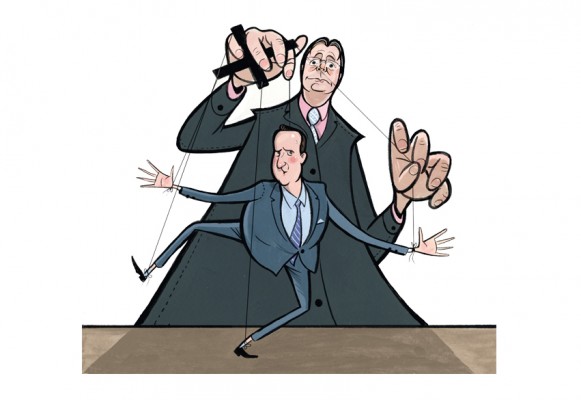Sir Jeremy Heywood’s evidence to MPs on the Andrew Mitchell row didn’t go down very well at all this morning. Though a powerful man, the Cabinet Secretary is not well-liked by MPs, and before he appeared some had already named him as a central figure in the fiasco that led to the chief whip resigning. The Public Administration Select Committee hearing did little to improve this perception. Here are the main problems with his evidence:
1. Heywood’s investigation was limited.
The Cabinet Secretary said he was asked to conduct a ‘very specific review’ of emails about Mitchell’s behaviour from a man claiming to be a constituent of the deputy chief whip to see whether they should change the Prime Minister’s view of whether Mitchell should remain in position. He explained that he talked to Mitchell, examined Number 10 and Foreign Office CCTV footage and tried unsuccessfully to meet the person who sent the email. The deputy chief whip John Randall met the constituent, and asked whether he had any links with the police or the media, which he denied.
2. He ignored the possibility of a ‘giant conspiracy’.
Sir Jeremy’s report ‘made clear that there were some inaccuracies and inconsistencies’ in the email account of the incident, but he did not follow up his suspicions with the police:
‘We accepted there were unanswered questions including the possibility of a gigantic conspiracy, or a small conspiracy, but we decided on balance to leave things as they were.’
Alun Cairns’ interrogations were particularly useful on this, and you can listen to the exchange here, from 09:54 onwards.
Cairns has been commenting on the committee on the Daily Politics, and he said:
‘What surprised me was that the evidence, as he analysed the evidence, he looked at it in isolation rather than bringing it together. So there was clearly an inconsistency from the email to the police log to the CCTV and he hadn’t brought them all together. And if he brought them all together, that clearly showed significant questions or serious questions that probably should have brought to the police or the IPCC’s [Independent Police Complaints Commission] attention.
‘I think he should have come to the conclusion that further investigation was necessary. If that was beyond his remit, and recommended to the Prime Minister ‘I think we need to look further at that’, and he suggested that he didn’t do so.’
Heywood’s explanation was the classic civil servant I’m-just-doing-my-job line that his remit was simply to investigate the emails for the Prime Minister, and that it would not have been appropriate for a Cabinet Secretary to examine the veracity of the police logs.
3. He did not probe the most damaging claim about the exchanges: the word ‘pleb’.
Although it was clear that the most damaging part of the allegations was not such much the swearing but the use of the word ‘pleb’, Heywood told the committee ‘I didn’t look at the question of whether the word ‘pleb’ was used’. There was a record held by Number 10 of a conversation with a police officer immediately after the incident, but Heywood said ‘I can’t remember specifically the word’. This is the exchange with Bernard Jenkin at the very end of the committee hearing:
Jenkin: Can I just clarify one matter?
Heywood: Yes.
Jenkin: Did we hear you correctly when you said that the principal private secretary who spoke to the police sergeant in question did not take a note of that conversation?
Jenkin: He did take a note, he did take a note. I think the question was whether I read that as part of my review. I’ve seen, I have read it, there is a note, and I have read it subsequently, but it wasn’t relevant to my review of the emails.
Alun Cairns picked this up a few minutes later:
Cairns: Just, Sir Jeremy, for clarification, you said to the committee and I just want to make sure that it’s been heard properly, to be honest, I didn’t look at whether the word pleb was used. Is that right or not?
Heywood: It is correct that I didn’t look at that because that’s an issue which you could not establish from silent CCTV footage.
Cairns: But isn’t that fundamentally what the Prime Minister needed to know?
Heywood: Well, there were two stages here, there was the first stage, in the immediate aftermath of the incident, when the police had one version of the events and Andrew Mitchell had another…
Jenkin: But the principal private secretary’s note used the word pleb?
Heywood: I can’t recall that, to be honest.
Jenkin: So there’s a record in Number 10 of a conversation with a police officer immediately after the incident that goes absolutely to the heart of the controversy and you cannot remember whether the word pleb is in that note.
Heywood: I can’t remember whether it specifically…
Jenkin: Because it wasn’t in your remit?
Heywood: No, it wasn’t in my remit, no. Absolutely not in my remit. So there was the issue about whether the word pleb had been used, and the police took one version of events and Andrew Mitchell has always maintained he never used that word and the Prime Minister takes that.
Jenkin: Well, we suspect there will be some very big lessons to learn in this instance, Sir Jeremy.
The transcript of these exchanges misses the wonderful twinkling look of disapproval and disbelief in Jenkin’s eyes as he says slightly sardonically ‘because it wasn’t in your remit?’, followed by a very uncomfortable Heywood glancing uncomfortably from side to side as he says that looking for the word ‘pleb’ was ‘absolutely not in my remit’. Remember that Jenkin was one of the senior Conservatives most critical of colleagues’ behaviour at the 1922 committee meeting in the week of Mitchell’s resignation: he will have taken a dim view of a failure in Number 10 to try to calm matters when the row first flared up.







Comments